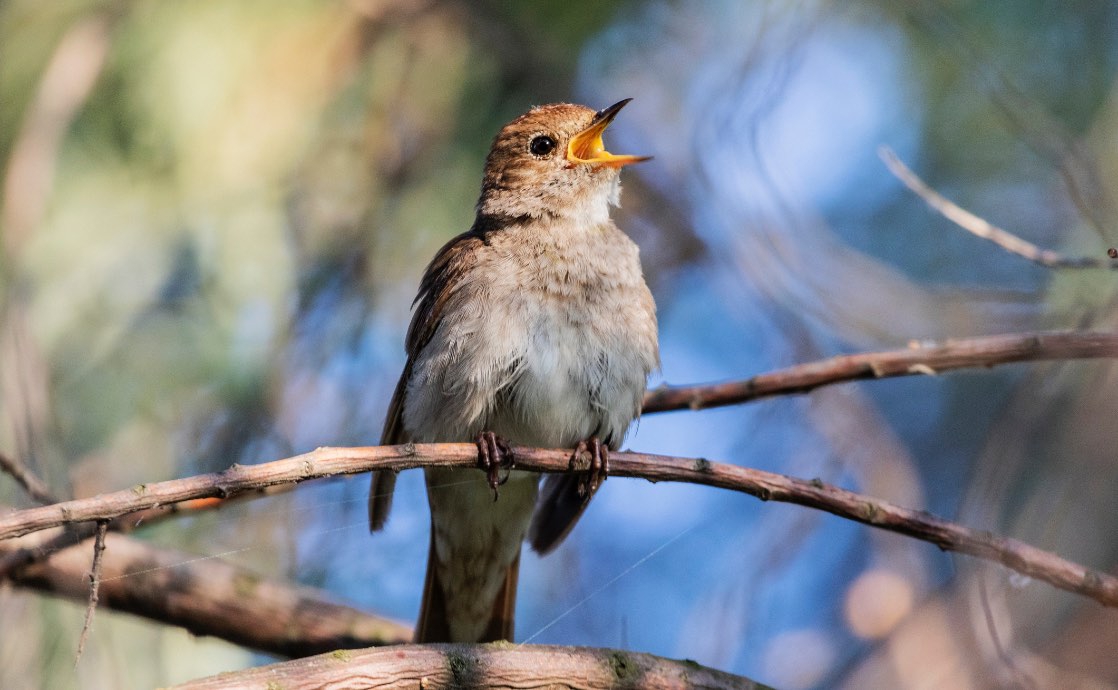The views expressed in our content reflect individual perspectives and do not represent the authoritative views of the Baha'i Faith.
While many people grew up loving their dogs and cats, I’ve always been drawn to the animals I encounter in nature, like deer and birds.
Ever since I was little, birds have fascinated me. Their ability to fly often enchanted me and their chirping soothed and uplifted me. I remember when I was in early elementary school, I would walk up to the birds in my front yard and say, “Tweet tweet!” and pretend they were responding back to me. Perhaps I was influenced by Snow White and Sleeping Beauty.
RELATED: The Sweet Symbolism and Spiritual Meaning of Doves
The older I get, the more I realize how universal and mystical the allure of birds is. One in particular holds a special charm, thanks to its sweet and entrancing song: the nightingale.
The Charm and Poetic Symbolism of Nightingales

Nightingales are small songbirds native to Europe, Asia, and Africa. The males of this species usually sing at night to serenade their potential mate. The name, “nightingale,” is derived from night and the Old English galan, which means “to sing.” They are literally night singers!
Although most people have not seen a nightingale up close, because they are so shy and often hide in underbrush, their spontaneous songs are considered to be one of the most beautiful sounds in nature. They can generate over 1000 different sounds, with a wide range of whistles and trills, inspiring poets and writers to use these birds as symbols in their works throughout history.
RELATED: The Spiritual Meaning and Symbolism of Sparrows
For example, nightingales are featured in Homer’s “The Odyssey,” John Keats’s “Ode to a Nightingale,” and in Shakespeare’s “Sonnet 102.” In the essay, “A Defence of Poetry,” 19th century poet Percy Bysshe Shelley wrote:
A Poet is a nightingale, who sits in darkness and sings to cheer its own solitude with sweet sounds; his auditors are as men entranced by the melody of an unseen musician, who feel that they are moved and softened, yet know not whence or why.
The nightingale is also the national bird of Ukraine, Croatia, and Iran. For almost 1,000 years, the nightingale has been a popular motif in Persian literature and often symbolizes the poet, or lover, who longs for the object of their affection. The nightingale’s beloved is usually depicted as a rose in Persian poetry.
The Spiritual Meaning of Nightingales in the Baha’i Faith

The nightingale’s desire for the rose is used as a metaphor in the Baha’i Faith as well. In a talk given by Abdu’l-Baha, one of the central figures of the Baha’i Faith, he said:
Like a moth, one must be a lover of the light, in whatever lamp it may shine; and like a nightingale, one must be enamoured of the rose, in whatever bower it may bloom.
The nightingale symbolizes those who are searching after truth and the rose represents divine teachings and spiritual reality. He explained:
One must seek after the manifold grace of God, search out the divine effulgences, and become enraptured and enthralled with any reality in which they are clearly and plainly found. Consider that, if the Jews had not clung to the horizon of Moses but had fixed their gaze upon the Sun of Truth, they would have undoubtedly beheld that Sun shining in the fullness of its divine splendour in that true dawning point that was Christ.
Baha’is believe that God has never left humanity alone, but has sent divine teachers, or Manifestations of God, to aid in humanity’s spiritual development. These Manifestations include Abraham, Zoroaster, Moses, the Buddha, Krishna, Jesus Christ, Muhammad, and the Bab. Baha’is believe that the divine messenger for this age is Baha’u’llah — who came to unite all humanity and founded the Baha’i Faith. In a Baha’i prayer called “Tablet of Ahmad,” Baha’u’llah wrote:
Lo, the Nightingale of Paradise singeth upon the twigs of the Tree of Eternity, with holy and sweet melodies, proclaiming to the sincere ones the glad tidings of the nearness of God, calling the believers in the Divine Unity to the court of the Presence of the Generous One, informing the severed ones of the message which hath been revealed by God, the King, the Glorious, the Peerless, guiding the lovers to the seat of sanctity and to this resplendent Beauty.
This “Nightingale of Paradise” is Baha’u’llah, whose sweet and holy words draw us nearer to God. Both nightingales and the Nightingale of Paradise were forced to suffer in the 19th century for their powerful melodies.
Just like bird catchers cruelly trapped large numbers of nightingales to try to “capture” their songs, Baha’u’llah endured 40 years of imprisonment, torture, and exile for announcing a new divine revelation. Although the caged nightingales that survived until the fall often killed themselves by crashing against the cage bars, their melodies could never be forgotten. And, Baha’u’llah’s mystical song continues to spread, as his unifying messages are shared around the world.
In other Baha’i texts, nightingales symbolize spiritual steadfastness and delight. In a prayer for youth, Abdu’l-Baha wrote:
O Thou kind Lord! Bestow heavenly confirmation upon this daughter of the kingdom, and graciously aid her that she may remain firm and steadfast in Thy Cause and that she may, even as a nightingale of the rose garden of mysteries, warble melodies in the … most wondrous tones, thereby bringing happiness to everyone.
Just like a sweet melody, a kind word and peaceful tone of voice can uplift our spirits. God wants us to be spiritually strong, praise what is godly, and gladden all hearts through the beauty around us — and within us.
















Comments
Sign in or create an account
Continue with Googleor